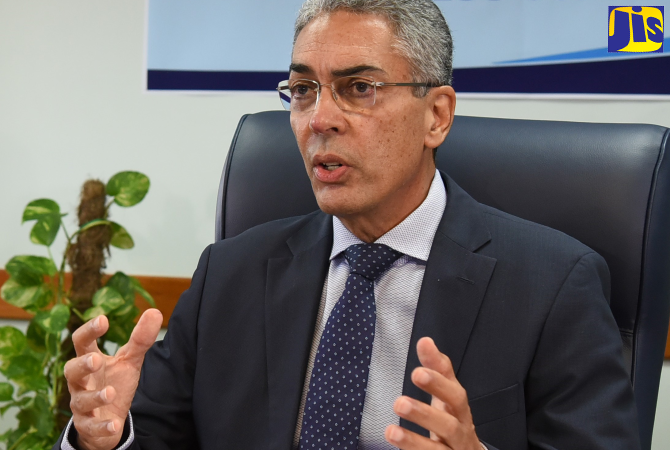Jamaica’s foreign exchange market remains relatively stable, partly reflecting actions by the Central Bank in response to higher than targeted inflation.
According to Bank of Jamaica (BOJ) Governor, Richard Byles, the foreign exchange rate for fiscal year 2022/23, to November 11, depreciated by 0.5 per cent.
This was significantly slower than the 6.7 per cent depreciation recorded over the corresponding period of 2021/22 he said, while speaking during the BOJ’s semi-virtual quarterly media briefing on Friday (November 18).
Mr. Byles said the Central Bank, in this context, sold US$396.1 million via its BOJ Foreign Exchange Intervention and Trading Tool (B-FXITT) facility over the period.
This, he added, was complemented by sales of US$442.7 million to selected public enterprises, including State oil refinery – PETROJAM.
“Notwithstanding these sales, the Bank net purchased from the market, over this period, US$521.6 million. As at November 11, 2022, Jamaica’s gross international reserves remained substantial at approximately US$4.3 billion. The Bank projects that the gross reserves will continue to remain adequate in the medium-term,” the Governor further stated.
The Statistical Institute of Jamaica (STATIN) reported that inflation stood at 9.9 per cent in October, spiralling past the Bank’s four to six per cent target range.
Mr. Byles said while some of the key drivers of headline inflation, such as grains and shipping prices, continue to trend downwards on the world markets, “we are not yet seeing the full pass-through to domestic food prices.”
Consequently, he said the BOJ announced an additional 50 basis points increase on the policy interest rate to seven per cent, effective November 21.
Additionally, Mr. Byles said the Bank’s Monetary Policy Committee decided to continue Jamaican dollar liquidity expansion containment and maintain relative foreign exchange market stability.
He pointed out that the Bank’s policy actions are expected to cause interest rates on deposits and loans to further rise, “making savings in Jamaican dollars more attractive, relative to foreign currency assets, and borrowing in Jamaican dollars more expensive.”
“They are, consequently, expected to help to reduce the demand for foreign currency, underpinning a more stable exchange rate and hence lower inflation. The measures are also intended to constrain aggregate demand and, consequently, limit the ability of businesses to pass on price increases to consumers,” the Governor added.
Meanwhile, Mr. Byles assured that the domestic financial system remains resilient. This, he noted, against the background of rising macro-financial risks over the past six to nine months.
“Deposit-taking institutions’ (DTIs) balance sheets have remained adequately capitalised and in compliance with prudent liquidity standards. Growth in DTIs’ loans and advances to the private sector started to pick up in the September 2022 quarter, relative to the previous quarter,” the Governor informed.
Mr. Byles added that the quality of the DTIs’ loan portfolio remained stable, “with [the] ratio of non-performing loans to gross loans showing improvement, when compared to a year earlier.”



